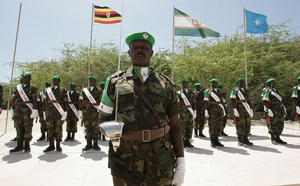MaliAfrican Union backs military campaign plan to end Islamist control of break-away north Mali
The time is running out for the al Qaeda-affiliated Islamist militants who seized control of the break-away region in northern Mali, as the African Union (AU) has backed a plan to send troops into Mali to evict them; the AU endorsed the decision by ECOWAS, an organization of West African countries, which, on Sunday, finalized and approved plans to send 3,300 troops to help Mali’s government take over the region and reunite the country; the ECOWAS plan will now be submitted to the UN Security Council for approval within the next three weeks

African Union troops commit to fighting Islamists in north Mali // Source: hadaaftimo.com
The time is running out for the al Qaeda-affiliated Islamist militants who seized control of the break-away region in northern Mali, as the African Union (AU) has backed a plan to send troops into Mali to evict Islamist extremists.
The AU endorsed the decision by ECOWAS, an organization of West African countries, which, on Sunday, finalized and approved plans to send 3,300 troops to help Mali’s government take over the region and reunite the country.
The ECOWAS plan will now be submitted to the UN Security Council for approval within the next three weeks.
The United States and France have already said they would offer logistical and intelligence support to the operation.
Following to ouster of Colonel Qaddafi in neighboring Libya in October 2011, and a military coup in Mali in March 2012, a coalition of ethnic Tuareg and al Qaeda-affiliated Islamists kicked the weakened Mali army out of north Mali and declared the independent state of Azawad. By the end of April, however, the Islamist Ansar Dine group seized control in the break-away region, and implemented strict Sharia law in it. A quarter of the population, about 400,000 fled to neighboring countries.
Meanwhile, the military relinquished power in Bamako, Mali’s capital, allowing the civilian government to return. Both the government and the military, however, are divided and weak, and are in no position to start a campaign to oust the Islamists and unite the torn country.
The neighboring countries – Niger, Mauritania, Algeria, and Burkina Faso – decided to take it upon themselves to settle the issue. These countries have grown increasingly worried about the growing waves of Tuareg refugees fleeing into their territories, and about the emergence of a haven for militant Islamist extremist on their door-steps.
The United States and France, sharing the fear about growing instability in west Africa and determined to deny al Qaeda a Pakistan-like safe haven, have been actively involved in facilitating the ECOWAS plan and the AU endorsement of it.
The BBC reports that the ECOWAS plan envisions a 6-month effort: the first, preparatory phase, lasting two to three months, will see training of troops – who will come from Nigeria, Niger, and Burkina Faso — and the establishment of bases in Mali’s south (bases in north Niger and south Algeria are already in operation). The second phase, estimated to last two or three months as well, will see combat operations in the north,
After endorsing the plan, the AU’s Peace and Security commissioner, Ramtane Lamamra, said other African countries could provide troops and logistical support.
“This deployment aims to respond to the request by the Malian authorities to regain the occupied regions in the north of the country, dismantle the terrorist and criminal networks and restore effectively the authority of the state over the entire national territory,” he told reporters in the Ethiopian capital, Addis Ababa, where the AU is based.
The plan ECOWAS developed is the result of a 45-day deadline the UN gave African leaders on 12 October to draw up a plan for military intervention to retake the north.
The BBC notes that West African battalions will need logistical and intelligence support from outside the region, as well as air power, to engage in a military operation that could last up to three months.
The European Union is now working out plans to send hundreds of instructors to train the Malian army. That army was always corrupt and ineffective, but under the twin blows of the March coup and the loss to the rebels in the north, it is now on the verge of disintegration.
French president Francois Hollande reiterated on Tuesday that France would provide “logistical support and training” for any mission to Mali, but would not send in soldiers.
Two weeks ago U.S. secretary of state Hillary Clinton, in a visit to Algeria, reached an agreement with the Algerian president on Algerian support for a military operation in Mali. It was an achievement for the Obama administration. Algeria has a formidable military, but its leaders have been hesitant about using it against the rebels in Mali for fear that such a move would enrage members of the Tureg minority in Algeria. Also, Algeria, which fought a bitter war with its own Islamists from 1992 to 1998, is worried that Islamists driven out of Mali would end up joining with Islamists in Algeria.
Algeria thus supported a negotiated settlement. The agreement reached with Clinton will see the two or three months of the first, preparatory phase of the ECOWAS plan also used to try and reach a negotiated end to the Islamist control of north Mali and the reunification of the country. If, at the end of this period, there is no political solution, Algeria will support the military action, for which the forces will now be ready.
